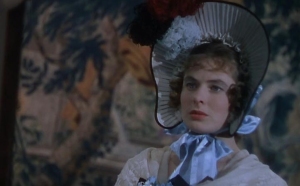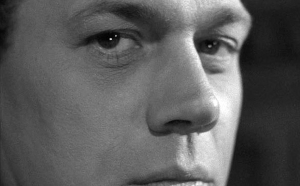If Waltzes from Vienna or Jamaica Inn didn’t convince that Hitchcock really can’t do period dramas, Under Capricorn might be the conclusive bit of evidence you need. While it’s not quite as bad his earlier efforts at the genre, it’s still a bland, sluggish final entry to Hitchcock’s ’40s success as well as a disappointing end to his films starring Ingrid Bergman.
Welcome to Australia, 1831, brought to us in vibrant Technicolor. Charles Adare (Michael Wilding) arrives from Ireland to visit his uncle who’s been appointed the governor of New South Wales and hopefully make his fortune. He’s introduced to former convict and current businessman Sam Flusky (Joe Cotten) and his troubled, alcoholic wife Henrietta (Bergman). Charles tries to help her rehabilitate and in doing so falls in love with her (whoops) which causes a whole lotta tension, not least because the housekeeper Milly (Margaret Leighton) is secretly in love with Sam and tries to ruin his marriage.
Under Capricorn is visually beautiful. Hitch utilized the same ambitious long shots seen in Rope but the camerawork is freer now he’s abandoned the “all in one take” gimmick. Other than that, however, there is painfully little to recommend.
Cotten and Bergman have both given sensational performances in earlier Hitchcock films, but here they struggle with the woefully wooden script. A real disappointment given their calibre of talent. As for the other characters, they don’t fare much better. Wilding is entire forgettable as the lead and the manipulative housekeeper, Milly, is played as a watered down version of Mrs. Danvers from Rebecca.
After an absolutely dire first half, the plot picks up a bit towards the end as a few twists and turns are thrown into proceedings. But at nearly two hours long it’s too little too late. They movie’s had nearly 100 minutes to make me care about these characters and it failed. At this stage, no amount of plot twists can change that.
Despite the big-name cast and sophisticated cinematography, Under Capricorn is a step back in time for Hitchcock in terms of storytelling. For all the elegant, swooping shots Hitchcock could throw at it, nothing could stop it from being utterly inert.



























